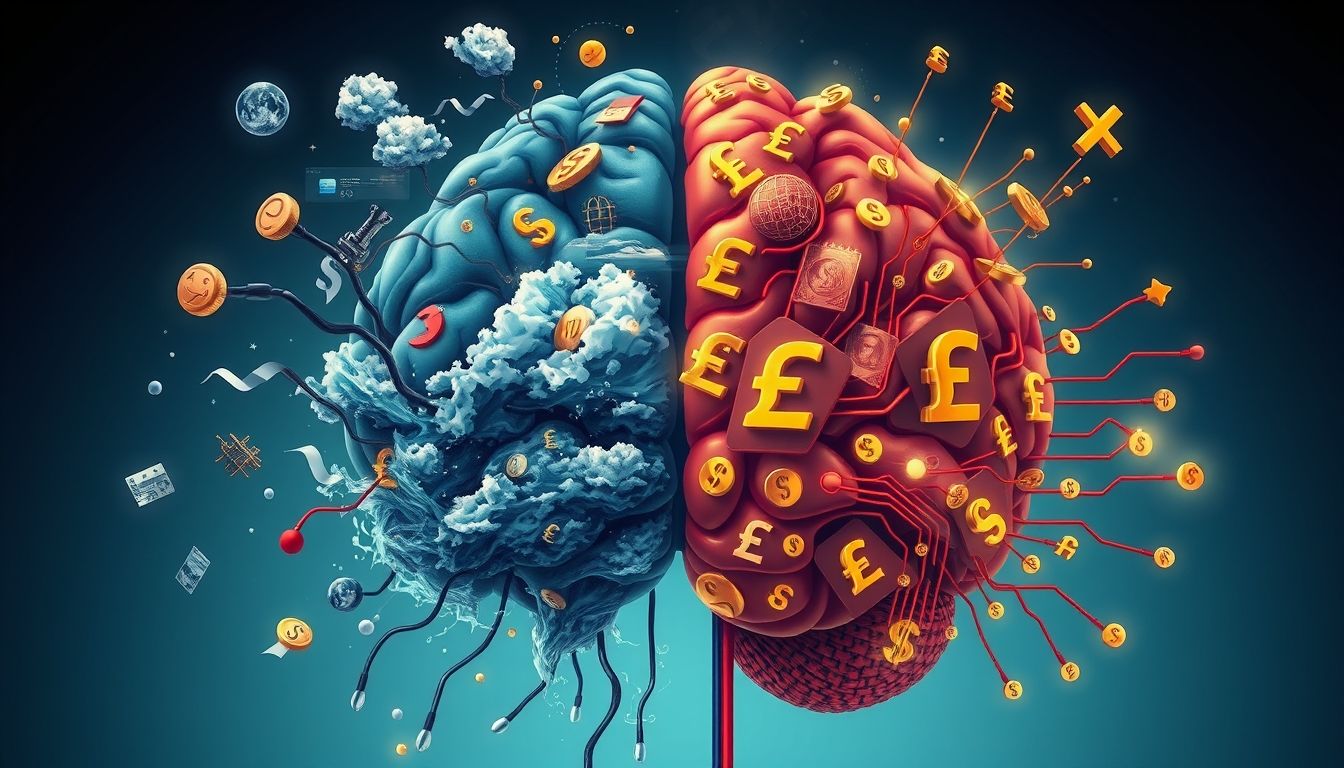سيكولوجية الفوركس: كيف يؤثر عقلك على أرباحك في سوق العملات
تداول العملات الأجنبية، أو الفوركس، ليس مجرد تحليل للرسوم البيانية والمؤشرات الفنية. إنه أيضًا اختبار لقدرتك على التحكم في عواطفك واتخاذ قرارات عقلانية تحت الضغط. علم نفس التداول يلعب دورًا حاسمًا في تحديد ما إذا كنت ستنجح أم تفشل في هذا السوق المتقلب.
الفصل الأول: العواطف المدمرة في سوق الفوركس
الخوف والطمع: وجهان لعملة واحدة
الخوف والطمع هما من أقوى العواطف التي تؤثر على المتداولين. الخوف من خسارة المال يمكن أن يؤدي إلى قرارات متسرعة مثل إغلاق صفقات رابحة مبكرًا أو التردد في الدخول في صفقات واعدة. الطمع، من ناحية أخرى، يمكن أن يدفع المتداولين إلى المخاطرة بأكثر مما ينبغي، أو الاحتفاظ بصفقات خاسرة على أمل أن تتحسن الأوضاع.
مثال: متداول مبتدئ يفتح صفقة شراء على زوج اليورو/الدولار. بعد ارتفاع السعر قليلاً، يشعر بالخوف من أن يعكس السوق اتجاهه، فيغلق الصفقة بربح صغير. لاحقًا، يرتفع السعر بشكل كبير، ويدرك المتداول أنه فوّت فرصة تحقيق أرباح كبيرة بسبب خوفه.
الغضب والإحباط: ردود فعل طبيعية.. لكن خطيرة
الخسائر المتتالية يمكن أن تؤدي إلى الغضب والإحباط، مما قد يدفع المتداول إلى اتخاذ قرارات انتقامية غير مدروسة. محاولة "استعادة" الخسائر بسرعة غالبًا ما تؤدي إلى مزيد من الخسائر.
إحصائية: تشير الدراسات إلى أن أكثر من 70% من المتداولين الذين يخسرون المال في سوق الفوركس يفعلون ذلك بسبب اتخاذ قرارات عاطفية.
الفصل الثاني: التحيزات المعرفية وتأثيرها على قرارات التداول
التحيز التأكيدي: رؤية ما تريد أن تراه
التحيز التأكيدي هو الميل إلى البحث عن المعلومات التي تؤكد معتقداتك الحالية وتجاهل المعلومات التي تتعارض معها. هذا يمكن أن يؤدي إلى تجاهل إشارات السوق الهامة والتمسك بصفقات خاسرة.
تأثير القطيع: اتباع التيار
تأثير القطيع هو الميل إلى اتباع ما يفعله الآخرون، حتى لو كان ذلك يتعارض مع تحليلك الخاص. هذا يمكن أن يؤدي إلى الدخول في صفقات سيئة فقط لأن "الجميع يفعل ذلك".
"تأثير القطيع هو ظاهرة نفسية حيث يتبع الأفراد تصرفات مجموعة كبيرة، بغض النظر عن آرائهم أو معلوماتهم الخاصة."
الفصل الثالث: إدارة المخاطر العاطفية: استراتيجيات عملية
وضع خطة تداول محكمة
وجود خطة تداول واضحة ومحددة يساعد على اتخاذ قرارات عقلانية حتى في ظل الضغط. يجب أن تتضمن الخطة أهدافًا واقعية، وقواعد صارمة لإدارة المخاطر، ومعايير محددة للدخول والخروج من الصفقات.
استخدام أوامر وقف الخسارة وجني الأرباح
أوامر وقف الخسارة وجني الأرباح تساعد على حماية رأس المال وتقليل تأثير العواطف على قرارات التداول. تحدد هذه الأوامر مسبقًا النقاط التي سيتم فيها إغلاق الصفقة تلقائيًا، بغض النظر عن شعورك.
تدوين الصفقات وتحليل الأخطاء
تدوين جميع الصفقات، بما في ذلك الأسباب التي دفعتك إلى اتخاذ القرار والنتائج، يساعد على تحديد الأنماط السلوكية التي تؤدي إلى الخسائر. تحليل هذه الأخطاء يساعد على تعلم كيفية تجنبها في المستقبل.
الفصل الرابع: تقنيات السيطرة على العواطف
التنفس العميق والتأمل
تقنيات التنفس العميق والتأمل يمكن أن تساعد على تهدئة الأعصاب وتقليل التوتر. هذه التقنيات يمكن أن تكون مفيدة بشكل خاص قبل وبعد التداول.
ممارسة الرياضة بانتظام
ممارسة الرياضة بانتظام تساعد على تحسين المزاج وتقليل التوتر والقلق. هذا يمكن أن يؤدي إلى اتخاذ قرارات تداول أكثر عقلانية.
الحصول على قسط كاف من النوم
الحصول على قسط كاف من النوم ضروري لصحة الدماغ والقدرة على اتخاذ قرارات جيدة. قلة النوم يمكن أن تؤدي إلى زيادة التوتر وتقليل القدرة على التركيز.
الفصل الخامس: بناء عقلية تداول ناجحة
التركيز على العملية وليس النتائج
بدلاً من التركيز على الأرباح والخسائر الفورية، ركز على اتباع خطة التداول الخاصة بك وتنفيذها بدقة. إذا اتبعت الخطة بشكل صحيح، فستتحسن النتائج بمرور الوقت.
تقبل الخسارة كجزء من اللعبة
الخسارة أمر لا مفر منه في سوق الفوركس. تقبل الخسارة كجزء من اللعبة وتعلم منها بدلاً من أن تدعها تؤثر على قراراتك المستقبلية.
التحلي بالصبر والمثابرة
النجاح في سوق الفوركس يتطلب وقتًا وجهدًا. كن صبورًا ومثابرًا ولا تستسلم عند أول عقبة.
الفصل السادس: دور علم النفس السلوكي في فهم سلوك السوق
علم النفس السلوكي يقدم رؤى قيمة حول كيفية اتخاذ المتداولين قراراتهم، وكيف يمكن أن تؤثر هذه القرارات على حركة السوق. فهم هذه المبادئ يمكن أن يساعدك على توقع سلوك السوق واتخاذ قرارات تداول أفضل.
الفصل السابع: تأثير وسائل الإعلام والأخبار على العواطف
وسائل الإعلام والأخبار يمكن أن تؤثر بشكل كبير على عواطف المتداولين. الأخبار السلبية يمكن أن تؤدي إلى الخوف والذعر، بينما الأخبار الإيجابية يمكن أن تؤدي إلى الطمع والتهور. كن حذرًا من تأثير وسائل الإعلام وحاول أن تحافظ على منظور متوازن.
الفصل الثامن: أهمية المرشد أو المدرب
وجود مرشد أو مدرب متمرس يمكن أن يكون له تأثير كبير على نجاحك في سوق الفوركس. يمكن للمرشد أن يقدم لك الدعم والتوجيه والنصيحة، ويساعدك على تجنب الأخطاء الشائعة.
الفصل التاسع: أدوات وتقنيات لتقييم حالتك النفسية
هناك العديد من الأدوات والتقنيات التي يمكنك استخدامها لتقييم حالتك النفسية وتحديد ما إذا كنت في حالة ذهنية مناسبة للتداول. هذه الأدوات يمكن أن تشمل الاستبيانات والمذكرات اليومية وبرامج تتبع العواطف.
الفصل العاشر: الاستمرارية والتطوير الذاتي
تداول الفوركس هو رحلة مستمرة من التعلم والتطوير الذاتي. استمر في تعلم مهارات جديدة وتحسين استراتيجياتك وتطوير قدرتك على التحكم في عواطفك. النجاح في سوق الفوركس يتطلب التزامًا مستمرًا بالنمو والتطور.
نصيحة أخيرة: تذكر دائمًا أن التداول الناجح يعتمد على مزيج من المعرفة والمهارات والسيطرة على العواطف. استثمر في تطوير هذه الجوانب الثلاثة، وستزيد فرصك في تحقيق النجاح في سوق الفوركس.




